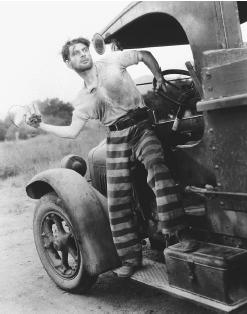 “J.L. Shall Hear Of This!”
“J.L. Shall Hear Of This!”When I was a child, I was certainly aware of all the big Hollywood studios, but I was naturally too young to pick up on their differences (with the obvious exception of Buena Vista). Came adolescence, and the classic Universal horror movies arrived on television and broke Uncle Carl’s baby out of the pack. But when my appreciation of film began in earnest, it became abundantly clear that one studio had become my one-and-only: Warner Bros. (Yes, “Bros.” It hasn’t been spelled out since the silent era.)
Oh, it wasn’t At First Sight. There had been numerous TV shows—77 Sunset Strip and its brethren, Maverick and its cousins, all constantly reminding us that they were WARNER BROS. PRODUCTIONS!!!—and of course that triple-platinum library of cartoons (to this day, I can’t help but break into a big, goofy grin whenever I hear that opening guitar glissando). But as house styles began to crystallize for me, it was clear that the Burbank lot’s output, with its rat-a-tat pace, smart-ass dialogue, real-world behavior and non-pareil roster of stars and character actors, seemed as fresh and lively as it did when it first hit the s
 creen. And not just THE BIG SLEEP and THE ADVENTURES OF ROBIN HOOD; even simple B-pictures like SMART BLONDE (the first “Torchy Blane” movie) and SILK EXPRESS (a race-against-the-clock thriller set almost entirely on a train) felt alive and vibrant in a way that was almost superhuman.
creen. And not just THE BIG SLEEP and THE ADVENTURES OF ROBIN HOOD; even simple B-pictures like SMART BLONDE (the first “Torchy Blane” movie) and SILK EXPRESS (a race-against-the-clock thriller set almost entirely on a train) felt alive and vibrant in a way that was almost superhuman.I could program the Egyptian with Warner Bros. pictures for six full months before descending to the merely “excellent.” But until that glorious (and insane) day arrives, the upcoming festival which runs from the 12th through the 22nd makes a lovely sampler. There’s a brand-new documentary, “The Brothers Warner”—it’s okay to spell it out when you’re talking about the guys themselves—written and directed by Cass Warner (Harry’s granddaughter), which focuses on the lives of the four siblings who began the company. And there’s a goodly selection from the glory years of the 30s and 40s: star-making classics like CAPTAIN BLOOD and THE PUBLIC ENEMY, torn-from-the-headlines dramas like I AM A FUGITIVE FROM A CHAIN GANG and WILD BOYS OF THE ROAD (which had become totally forgotten until clips appeared in a documentary on director William Wellman), trademark crime thrillers like LITTLE CAESAR and HIGH SIERRA, literary adaptations like KINGS ROW and THE SEA WOLF, such pre-Code obscurities as LADIES THEY TALK ABOUT (Stanwyck in the slammer!) and THE MAYOR OF HELL, and more. And while DVDs are nice, nothing beats seeing these pictures in a theatre with an audience, where the snappy dialogue take on a life of its own as laughter ricochets around the auditorium.

When it comes time for me to cash in my chips (which, with my luck, will be the day before someone discovers the secret of immortality), I think I’d like to be buried on the Mt. Sinai hillside overlooking the studio, where my earthly remains will always be able to keep watch on the studio that has brought me so much joy. And hopefully, in true Tex Avery fashion, one of my friends will leave a little sign sticking out of the plot that reads, “Sad, isn’t it?”
Michael Schlesinger is a trustee of the American Cinematheque and a consultant at Sony Pictures. Which he also loves dearly.










